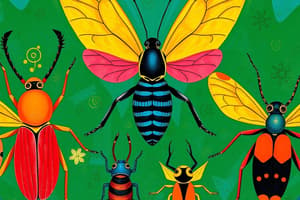Podcast
Questions and Answers
What is the primary function of juvenile hormones in insects?
What is the primary function of juvenile hormones in insects?
- To regulate metabolic functions
- To stimulate adult characteristic development
- To promote larval growth and prevent metamorphosis (correct)
- To initiate molting processes
Which glands are responsible for producing molting hormones in insects?
Which glands are responsible for producing molting hormones in insects?
- Neurosecretory cells
- Prothoracic glands (correct)
- Corpora allata
- Corpora cardiaca
What role do neurosecretory cells play in the insect endocrine system?
What role do neurosecretory cells play in the insect endocrine system?
- They secrete ecdysone.
- They coordinate bodily functions such as feeding and reproduction. (correct)
- They store juvenile hormones.
- They are responsible for metamorphosis.
Which hormone is primarily released by the corpora allata?
Which hormone is primarily released by the corpora allata?
What stimulates the production of ecdysone in insects?
What stimulates the production of ecdysone in insects?
Which of the following is NOT a component of the insect endocrine system?
Which of the following is NOT a component of the insect endocrine system?
What is the significance of the critical period in the insect endocrine system?
What is the significance of the critical period in the insect endocrine system?
Which hormone is known to inhibit the development of adult characteristics?
Which hormone is known to inhibit the development of adult characteristics?
What hormone is primarily responsible for initiating the molting process in insects?
What hormone is primarily responsible for initiating the molting process in insects?
Which hormone is secreted by the brain neurosecretory cells to stimulate the prothoracic glands?
Which hormone is secreted by the brain neurosecretory cells to stimulate the prothoracic glands?
What is the role of juvenile hormone in insect development?
What is the role of juvenile hormone in insect development?
Which hormone is responsible for tanning the insect cuticle?
Which hormone is responsible for tanning the insect cuticle?
What triggers the behavior associated with ecdysis?
What triggers the behavior associated with ecdysis?
What happens to the corpora allata during the last larval or nymphal stage?
What happens to the corpora allata during the last larval or nymphal stage?
Which of the following best describes the action of ecdysteroids in plants?
Which of the following best describes the action of ecdysteroids in plants?
What is the primary role of ecdysone in terms of epidermal cells?
What is the primary role of ecdysone in terms of epidermal cells?
Flashcards are hidden until you start studying
Study Notes
Insect Endocrine System
- Comprises parts responsible for hormonal regulation and bodily functions in insects.
- Involves chemical messengers called hormones secreted directly into the bloodstream.
Types of Hormones in Insects
- Brain Hormones: Regulate various physiological processes.
- Molting Hormones: Control the shedding and renewal of exoskeleton.
- Juvenile Hormones (JH): Important for growth and development.
Hormonal Control of Molting and Metamorphosis
- Sir Vincent Wigglesworth studied Rhodnius prolixus to discover that JH inhibits adult characteristics, allowing continued larval development.
- Critical Period: A specific timeframe where brain influence is essential for hormonal effects to manifest.
Endocrine Glands
- Neurosecretory Cells: Found in the protocerebrum, coordinate functions like feeding, metabolism, reproduction, and development.
- Corpora Cardiaca: Stores and releases hormones from neurosecretory cells, associated with the aorta.
- Corpora Allata: Secretes juvenile hormones, connected to the corpus cardiaca and subesophageal ganglion.
- Prothoracic Glands: Stimulated by brain hormones to produce molting hormone (ecdysone).
Key Hormones
- Prothoracicotropic Hormone (PTTH): Secreted from the corpus cardiacum; stimulates ecdysone production.
- Juvenile Hormone (JH): Promotes larval growth, preventing metamorphosis. Secreted by corpora allata and active during larval molts.
- Ecdysone (Molting Hormone): Secreted by prothoracic glands, initiates molting by stimulating epidermal cells; also found in some plants as a protective agent.
- Eclosion Hormone: Triggers ecdysis (molt behavior) as ecdysteroid levels fall.
- Bursicon: Causes sclerotization (hardening) of the exoskeleton through cross-linkages in the cuticle.
Hormones Involved in Insect Development
- Prothoracicotropic Hormone (PTTH): Stimulates the secretion of ecdysone from prothoracic glands.
- Ecdysone/Ecdysteroids: Promote synthesis of new cuticle in response to hormonal signals.
- Juvenile Hormone (JH): Regulates cuticle type and inhibits premature metamorphosis.
- Eclosion Hormone (ETH): Activates secretion of hormones necessary for ecdysis.
- Bursicon: Promotes tanning of the cuticle following molting, ensuring structural integrity.
Studying That Suits You
Use AI to generate personalized quizzes and flashcards to suit your learning preferences.




